Mamata Banerjee facts for kids
Quick facts for kids
Mamata Banerjee
|
|||||||||||||||||||||||||||||||||||||||||||||||||||||||||||||||||||||
|---|---|---|---|---|---|---|---|---|---|---|---|---|---|---|---|---|---|---|---|---|---|---|---|---|---|---|---|---|---|---|---|---|---|---|---|---|---|---|---|---|---|---|---|---|---|---|---|---|---|---|---|---|---|---|---|---|---|---|---|---|---|---|---|---|---|---|---|---|---|

Official portrait, 2015
|
|||||||||||||||||||||||||||||||||||||||||||||||||||||||||||||||||||||
| 8th Chief Minister of West Bengal | |||||||||||||||||||||||||||||||||||||||||||||||||||||||||||||||||||||
| Assumed office 20 May 2011 |
|||||||||||||||||||||||||||||||||||||||||||||||||||||||||||||||||||||
| Governor |
|
||||||||||||||||||||||||||||||||||||||||||||||||||||||||||||||||||||
| Preceded by | Buddhadeb Bhattacharjee | ||||||||||||||||||||||||||||||||||||||||||||||||||||||||||||||||||||
|
|||||||||||||||||||||||||||||||||||||||||||||||||||||||||||||||||||||
| Member of the West Bengal Legislative Assembly | |||||||||||||||||||||||||||||||||||||||||||||||||||||||||||||||||||||
| Assumed office 3 October 2021 |
|||||||||||||||||||||||||||||||||||||||||||||||||||||||||||||||||||||
| Preceded by | Sovandeb Chattopadhyay | ||||||||||||||||||||||||||||||||||||||||||||||||||||||||||||||||||||
| Constituency | Bhabanipur | ||||||||||||||||||||||||||||||||||||||||||||||||||||||||||||||||||||
| Majority | 58,835 | ||||||||||||||||||||||||||||||||||||||||||||||||||||||||||||||||||||
| In office 16 November 2011 – 2 May 2021 |
|||||||||||||||||||||||||||||||||||||||||||||||||||||||||||||||||||||
| Preceded by | Subrata Bakshi | ||||||||||||||||||||||||||||||||||||||||||||||||||||||||||||||||||||
| Succeeded by | Sovandeb Chattopadhyay | ||||||||||||||||||||||||||||||||||||||||||||||||||||||||||||||||||||
| Constituency | Bhabanipur | ||||||||||||||||||||||||||||||||||||||||||||||||||||||||||||||||||||
| Majority | 54,213 (2011) | ||||||||||||||||||||||||||||||||||||||||||||||||||||||||||||||||||||
| Chairperson of the All India Trinamool Congress | |||||||||||||||||||||||||||||||||||||||||||||||||||||||||||||||||||||
| Assumed office 2001 |
|||||||||||||||||||||||||||||||||||||||||||||||||||||||||||||||||||||
| Preceded by | Ajit Kumar Panja | ||||||||||||||||||||||||||||||||||||||||||||||||||||||||||||||||||||
|
|||||||||||||||||||||||||||||||||||||||||||||||||||||||||||||||||||||
| Member of Parliament, Lok Sabha | |||||||||||||||||||||||||||||||||||||||||||||||||||||||||||||||||||||
| In office 1991–2011 |
|||||||||||||||||||||||||||||||||||||||||||||||||||||||||||||||||||||
| Preceded by | Biplab Dasgupta | ||||||||||||||||||||||||||||||||||||||||||||||||||||||||||||||||||||
| Succeeded by | Subrata Bakshi | ||||||||||||||||||||||||||||||||||||||||||||||||||||||||||||||||||||
| Constituency | Kolkata Dakshin, West Bengal | ||||||||||||||||||||||||||||||||||||||||||||||||||||||||||||||||||||
| In office 1984–1989 |
|||||||||||||||||||||||||||||||||||||||||||||||||||||||||||||||||||||
| Preceded by | Somnath Chatterjee | ||||||||||||||||||||||||||||||||||||||||||||||||||||||||||||||||||||
| Succeeded by | Malini Bhattacharya | ||||||||||||||||||||||||||||||||||||||||||||||||||||||||||||||||||||
| Constituency | Jadavpur, West Bengal | ||||||||||||||||||||||||||||||||||||||||||||||||||||||||||||||||||||
| Leader of the House of West Bengal Legislative Assembly | |||||||||||||||||||||||||||||||||||||||||||||||||||||||||||||||||||||
| Personal details | |||||||||||||||||||||||||||||||||||||||||||||||||||||||||||||||||||||
| Born | 5 January 1955 Calcutta (now Kolkata), West Bengal, India |
||||||||||||||||||||||||||||||||||||||||||||||||||||||||||||||||||||
| Political party | All India Trinamool Congress (1998–present) |
||||||||||||||||||||||||||||||||||||||||||||||||||||||||||||||||||||
| Other political affiliations |
Indian National Congress (1975–1998) | ||||||||||||||||||||||||||||||||||||||||||||||||||||||||||||||||||||
| Relations | Abhishek Banerjee (nephew) | ||||||||||||||||||||||||||||||||||||||||||||||||||||||||||||||||||||
| Residences | 30-B, Harish Chatterjee Street, Kolkata | ||||||||||||||||||||||||||||||||||||||||||||||||||||||||||||||||||||
| Alma mater | University of Calcutta | ||||||||||||||||||||||||||||||||||||||||||||||||||||||||||||||||||||
| Signature | |||||||||||||||||||||||||||||||||||||||||||||||||||||||||||||||||||||
| Nicknames | Didi (transl. elder sister) | ||||||||||||||||||||||||||||||||||||||||||||||||||||||||||||||||||||
|
Position Held
1970–80: General-Secretary, Mahila Congress (I), West Bengal
1978–81: Secretary, District Congress Committee (Indira) [D.C.C. (I)], Calcutta South 1984: General-Secretary, All India Youth Congress (I) 1985–87: Member, Committee on the Welfare of Scheduled Castes and Scheduled Tribes 1987–88: Member, National Council, All India Youth Congress (I)Member, Consultative Committee, Ministry of Home AffairsMember, Consultative Committee, Ministry of Human Resource Development1988Member, Executive Committee, Congress Parliamentary Party [C.P.P. (I)] 1989: Member, Executive Committee, Pradesh Congress Committee [P.C.C. (I)], West Bengal 1990: President, Youth Congress, West Bengal 1993–96: Member, Committee on Home Affairs 1995–96: Member, Consultative Committee, Ministry of Home AffairsMember, Committee on Public Accounts 1996–97: Member, Committee on Home AffairsMember, Consultative Committee, Ministry of Home Affairs 1998–99: Chairman, Committee on Railways, Member of General Purposes CommitteeMember, Consultative Committee, Ministry of Home Affairs 1999: Leader, All India Trinamool Congress Parliamentary Party, Lok SabhaMember, General Purposes Committee 2001–2003: Member, Consultative Committee, Ministry of Industries 8 September 2003 – 8 January 2004: Union Cabinet Minister (without any portfolio) 2004: Member, Committee on Personnel, Public Grievances, Law & Justice 5 August 2006: Member, Committee on Home Affairs 5 August 2007: Member, Committee on Home Affairs 31 May 2009 – 19 July 2011: Leader, All India Trinamool Congress Parliamentary Party, Lok Sabha |
|||||||||||||||||||||||||||||||||||||||||||||||||||||||||||||||||||||
|
As of 9 October 2011
Source: [1] |
|||||||||||||||||||||||||||||||||||||||||||||||||||||||||||||||||||||
Mamata Banerjee (born 5 January 1955) is an important Indian politician. She has been the Chief Minister of West Bengal since May 20, 2011. She is the first woman to hold this high office in West Bengal.
Before becoming Chief Minister, Mamata Banerjee served as a Union Cabinet Minister several times. She started her own political party, the All India Trinamool Congress (AITC or TMC), in 1998. She is often called Didi, which means elder sister in Bengali.
Banerjee was also the Minister of Railways twice, being the first woman to do so. She also held positions like Minister of Coal and Minister for Human Resource Development. She became well-known for opposing the government's plans to take over farmland for factories. In 2011, her party won a big election in West Bengal. This ended the 34-year rule of the Communist-led government.
She was a member of the West Bengal Legislative Assembly from Bhabanipur from 2011 to 2021. In the 2021 elections, she lost her seat in Nandigram. However, her party won a large number of seats. She later won a by-election from Bhabanipur and became an MLA again.
Contents
Early Life and Education
Mamata Banerjee was born in Calcutta (now Kolkata), West Bengal. Her parents were Promileswar Banerjee and Gayetri Devi. Her father passed away when she was 17 years old.
She finished her higher secondary education in 1970. She then earned a bachelor's degree in history. Later, she got a master's degree in Islamic history from the University of Calcutta. She also studied education and law.
Mamata Banerjee became involved in politics at just 15 years old. She joined the student wing of the Indian National Congress party. She continued to be active in the Congress party in West Bengal.
Early Political Career (1984–2011)
Joining Congress Party
Mamata Banerjee started her political journey with the Indian National Congress in the 1970s. In 1984, she became one of India's youngest members of parliament. She won the Jadavpur seat in West Bengal. She also became the general secretary of the Indian Youth Congress that year.
She lost her seat in 1989 but was re-elected in 1991. She continued to win the Kolkata South seat in several elections until 2009. In 1991, she became a Union Minister of State. She was in charge of Human Resources Development, Youth Affairs and Sports, and Women and Child Development.
In 1993, a protest march led by Mamata Banerjee took place in Kolkata. It was against the Communist government. During this protest, 13 people were shot and killed by the police. An inquiry later described the police action as "unprovoked and unconstitutional."
Starting Trinamool Congress
In 1997, Mamata Banerjee left the Congress Party. She then helped create the All India Trinamool Congress (TMC). This new party quickly became the main opposition to the long-ruling Communist government in West Bengal.
In 1999, she joined the National Democratic Alliance (NDA) government. She became the Railways Minister. During her time as Railways Minister, she introduced new trains and focused on improving railway services in West Bengal. She also worked on developing tourism through railways.
In 2004, her party joined with the Bharatiya Janata Party for the general election. However, they lost, and she was the only TMC member elected from West Bengal. Her party also faced setbacks in the 2005 and 2006 elections.
Protests and Movements
Mamata Banerjee became known for leading protests against land acquisition. In 2005, she protested against the government taking farmland for industrial projects in Howrah.
Singur Protest
In November 2006, Banerjee was stopped from going to Singur. She was protesting a planned Tata Motors car factory there. She started a 26-day hunger strike in Kolkata to protest the government taking farmland. The Supreme Court of India later ruled in 2016 that the land acquisition for the Tata Motors plant in Singur was illegal.
Nandigram Protest
In 2007, there were protests in Nandigram against government plans to take land for a special economic zone. Police actions during these protests led to many deaths and injuries. There were also reports of serious harm to women and girls. Mamata Banerjee's strong opposition during this time helped her gain public support.
Electoral Success (2009–2011)
Before the 2009 parliamentary elections, she joined forces with the United Progressive Alliance (UPA). This alliance won 26 seats in West Bengal. Banerjee became the railway minister for the second time.
Her focus as railway minister was again on West Bengal. She introduced many new trains, including non-stop Duronto Express trains. She stepped down as railway minister in 2011 to become the Chief Minister of West Bengal.
Chief Minister of West Bengal
First Term (2011–2016)

In 2011, the All India Trinamool Congress, along with its allies, won the West Bengal legislative assembly election. This victory ended the 34-year rule of the Communist party, which was the longest-ruling democratically elected Communist party in the world.
Mamata Banerjee became the Chief Minister of West Bengal on May 20, 2011. One of her first actions was to return 400 acres of land to farmers in Singur. She also started reforms in education and health. For example, teachers began receiving their pay on time, and pensions for retiring teachers were processed faster.
In 2012, Bill Gates praised her government for achieving a full year without any reported cases of polio. Her time as Chief Minister also saw the creation of new police commissionerates to improve law and order. However, her tenure also faced challenges, including a financial scandal involving a company, which led to some party members facing legal issues.
Second Term (2016–2021)
In the 2016 assembly elections, the All India Trinamool Congress won a huge majority. Mamata Banerjee was elected as Chief Minister for her second term. Her party won 211 out of 293 seats.
In 2017, a scheme launched by her government called Kanyashree Prakalpa was recognized by the United Nations. It was ranked as the best among 552 social schemes from 62 countries.
Third Term (2021–Present)
In the 2021 assembly elections, AITC again won a large majority. Mamata Banerjee became Chief Minister of West Bengal for her third term. She took her oath on May 5, 2021. She later won the Bhabanipur by-election by a large margin.
After winning the election, she launched the Lakshmir Bhandar scheme. This program provides financial help to women under 60. Another important program is the Students Credit Card scheme. It offers financial loans to students who need help paying for higher education.
As of July 2025, Mamata Banerjee is the third-longest-serving Chief Minister of West Bengal.
Personal Life and Recognitions
Mamata Banerjee is known for her simple lifestyle. She often wears traditional Bengali clothes and avoids luxuries. She is a self-taught painter and a poet. Her paintings have been sold for significant amounts.
In 2012, Time magazine named her one of the 100 Most Influential People in the World. Bloomberg Markets magazine also listed her among the 50 most influential people in finance in 2012. In 2018, she received the Skoch Chief Minister of the Year Award.
She has received honorary doctorates in Literature from St. Xavier's University, Kolkata and Calcutta University. In 2021, she was invited to a World Meeting for Peace in Rome. However, the Indian government did not give her permission to attend. In September 2021, TIME magazine included Mamata Banerjee in its list of 'The 100 Most Influential People of 2021'.
In Popular Culture
A Bengali film called Baghini was released in 2019. This movie was inspired by Mamata Banerjee's life.
Works in Literature and Other Fields
Mamata Banerjee has written many books. In 2022, she received an award for her book 'Kabita Bitan', which contains 946 poems.
She is also a self-taught painter, and her artworks have been auctioned. Additionally, she is a lyricist. Her songs are often about 'Durga Puja' and her homeland.
Images for kids
See also
 In Spanish: Mamata Banerjee para niños
In Spanish: Mamata Banerjee para niños


























